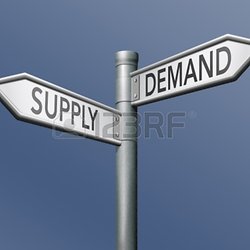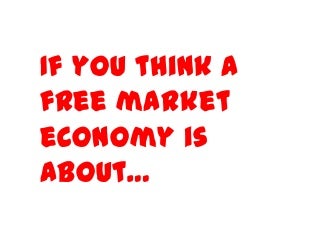 Fifteen years after China joined the World Trade Organization, Beijing’s hopes for clear recognition as a market economic system have been challenged. The market economic system is a social system of division of labour primarily based on the non-public ownership of the means of production. The market is the process that starts when varied performances of multiple individuals converge together underneath a scheme of division of labor, so that they end up being mutually cooperative. Monetary or economic calculation is the intellectual basis of the market economic system, and without him it is unimaginable that the goals that any action persogue are achievable in a scheme of division of labor. The function of the State is the create a social setting that enables the peaceful growth of the market economic system. The market economic system is a social system of division of labour primarily based on the non-public ownership of the means of production.
Fifteen years after China joined the World Trade Organization, Beijing’s hopes for clear recognition as a market economic system have been challenged. The market economic system is a social system of division of labour primarily based on the non-public ownership of the means of production. The market is the process that starts when varied performances of multiple individuals converge together underneath a scheme of division of labor, so that they end up being mutually cooperative. Monetary or economic calculation is the intellectual basis of the market economic system, and without him it is unimaginable that the goals that any action persogue are achievable in a scheme of division of labor. The function of the State is the create a social setting that enables the peaceful growth of the market economic system. The market economic system is a social system of division of labour primarily based on the non-public ownership of the means of production.
There is a blended economic system partly Socialist and partly capitalist, as a result of the production is directed by the market or it is organized by a planning authority. The market is a process launched by the varied actions of multiple individuals that cooperate underneath the regime of division of labour among themselves.
The value judgements of these folks, as well as the actions that arise from these appreciations are forces that determine the (continually changing) obtainable in the marketplace. The market is the point where converge the performances of people and, at the time, the Heart where originate. This second system is sometimes called socialism, communism, planned economic system or state capitalism. The economic system of market or pure capitalism, as it’s also usually known as, and the socialist economic system are antithetical terms. The production is directed by the market or it is ordered by the mandates of the dictatorial authority, either one-particular person or collegial. The State or municipalities possess and administer certain holdings never tarnish the everyday traits of the market economic system.
These firms, owned and managed by public power, are subject as non-public to the sovereignty of the market. The Administration can compensate their losses with State funds, nevertheless it neither suppresses nor mitigates the supremacy of the market. As a result of the funds masking those losses must be raised by way of taxes and the implications which such taxation will lead to society and in the economic structure are at all times those supplied for by the legislation of the market. It is the operation of the market – and not the State to lift taxes-that decides on who will fall the tax burden at the end and what will be the effects of this on production. It’s not a State Office, who will determine the functioning of public enterprises and the market.
It is a model that varieties the premise of the actual framework during which operate the economies of many international locations at present. Government’s function in a free-market economic system also contains protecting non-public property, imposing contracts, and regulating certain economic activities. Examples embody laws that limit youngster labor, prohibit toxic emissions, or forbid the sale of unsafe goods. Proponents of free-market economies imagine they provide an a variety of benefits. In communism, the government plans the economic system and all means of production are publicly owned.
